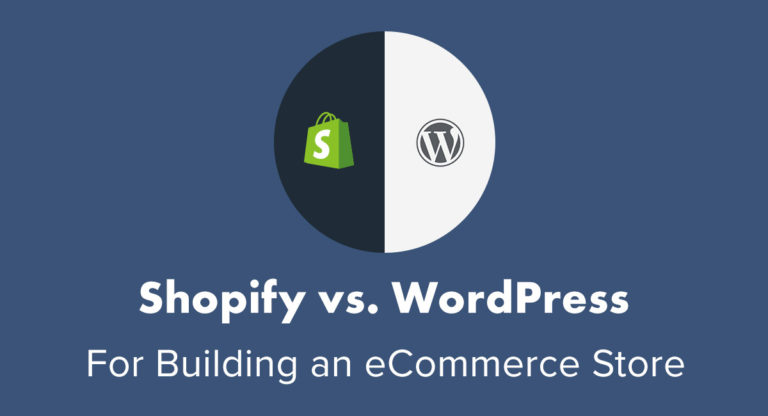
Shopify vs WordPress Which E-commerce Platform is better?
As the world keeps up to adopt the benefits and convenience of online shopping, e-commerce is becoming one of the most natural business options for today's entrepreneurs. After all, when you sell your products online, there's no need for expensive real-estate.
When you want to build an eCommerce website, at some point, you might ponder: “Shopify or WordPress, which one is better?” While both platforms allow you to build successful online stores, they are also very different.
In the new digital age, countless vendors have begun to create solutions for a new time of mobile, simple selling. From Square payment terminals for your casual pop-up shop to Shopify and WordPress for building online selling sites. Shopify and WordPress are the best-known names in the e-commerce world, with a status of accessibility, flexibility, and pronounced performance.
What’s the Difference between Shopify and WordPress?
Shopify is what’s known as a ‘website builder’. It has all the tools that help people with limited or no technical knowledge build their very own website. Shopify is built specifically for e-commerce, so it’s only ever used for creating online stores.
WordPress is a little different. WordPress.org is self-hosted software and is far more technically advanced. You can create just about any type of website with WordPress.org including online stores.
Staggeringly, WordPress.org is the force behind almost a third of all websites on the internet. On the other hand, you have Shopify, a world-renowned ecommerce platform that’s used by major businesses and celebrities alike, and powers over 600,000 online stores in total.
Shopify is created to assist people to develop their own online stores, meaning it has all the tools you could entail right at your fingertips. Unlike Shopify, WordPress doesn’t come set up for e-commerce, but there are some considerable plugins you can install to start trade online.
To set up a store with Shopify, all you do is create an account, choose a theme, add your products, and you’re off. In contrast, WordPress takes a little more time. You need to find hosting first, then install themes and plugins to get started and customize your website.
Shopify vs WordPress: Pros and Cons
Shopify Pros
● You do not need any coding or technical knowledge to employ Shopify
● It is built particularly for e-commerce websites, so all the sales tools you need are set up
● You don’t need to pay for hosting or security externally
Shopify Cons
● You have to pay extra transaction fees
● unless you use Shopify’s own payment gateway, Shopify Payments
● If you choose to change your theme, you will have to reformat your content
● It’s still not as basic or as simple to use as a drag-and-drop platform
WordPress Pros
● More robust and adaptable than Shopify, allowing for total customization
● Its new editor, ‘Gutenberg’, makes it slightly easier to use
● There are a huge amount of helpful resources online, both from user means and professional developers
WordPress Cons
● You will need a decent level of technical knowledge to use the platform
● It can get very expensive, very quickly
● You will need to source things like web hosting (we recommend Bluehost), security, and a domain name yourself
Ease of Use
Shopify is without a doubt an easier platform to use. Unlike WordPress, you neither need to have a cognizance of code nor you need to install extra software that allows you to sell online. With Shopify, you get all the necessary e-commerce features built-in.
Build Time
Because ease of use has the quickest influence on build time, Shopify is the quicker option. Again, everything you need is built-in, which saves you bags of time otherwise spent deciding on which e-commerce plugin to use on WordPress – not to mention sorting out hosting and security.
Templates and Themes
Ultimately, Shopify vs WordPress themes come down to whether you want simplicity or customization. Shopify’s themes are receptive and out-of-the-box, but there are limited alternatives and they can only be edited so much. WordPress themes differ in quality, but you can customize all. For us, both are equivalent.
Ecommerce Tools and Features
WordPress just beats Shopify for tools and features. You can search around for a plugin that ticks all the boxes you’re looking for and install it. That said, you’ll struggle to find much you can’t do with Shopify, almost everything imaginable is covered by a tool or app.
Payment Options and Transaction Fees
It’s another tie, this time for payment options and transaction fees. While Shopify is the best-rounded in terms of payment options, you will incur extra charges if you use anything other than Shopify Payments. None of WordPress’s plugins can emulate Shopify for payment options, but there are no extra charges.
Better for SEO
Another area, where Shopify comes up better with its SEO tools. Not only are most of its SEO capabilities built-in, but you can also install SEO specific apps if there’s anything more advanced you want to do. There is a common belief that website builders are bad for SEO, but Shopify emphatically dispels that myth.
Ongoing Maintenance & Security
Shopify conserves its superiority over WordPress, winning the ongoing maintenance round. Shopify and WordPress are both aspiring to make their platform flawless so updates are unavoidable the distinction is you need to keep on top of WordPress’ updates, while Shopify’s don’t require a second thought.
Customer Help & Support
Shopify takes the help and support category comfortably. There may not be the level of information online that there is about WordPress, but there’s no substitute for personal, dedicated help. The absolute number of ways you can contact Shopify for support make it the obvious winner.
How Much Do They Cost?
Despite the fact that WordPress is technically free, Shopify is much more economical overall. Plans range from $29/month – $299/month and include everything you need. WordPress is free to use, but you will need to pay off for hosting, themes, and plugins all separately.
We Recommend Shopify if
You have limited technical knowledge and want to create your own online store. It’s easy to keep a track of your budget as everything from your hosting and security, to extra features, is included in one monthly cost.
We Recommend WordPress if
You have some form of coding knowledge or the budget to pay for a developer’s help. You’ll get total control over your site’s customization and have an almost endless number of options when it comes to themes and plugins. However, you will need to be prepared to pay a lot for a top e-commerce site.




.png)
Leave a Reply